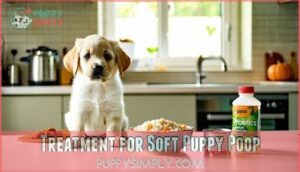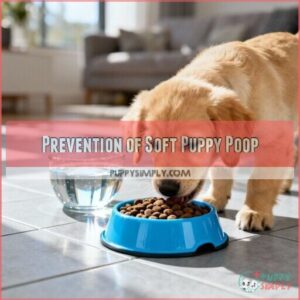This site is supported by our readers. We may earn a commission, at no cost to you, if you purchase through links.

A puppy’s digestive system is still developing, making it vulnerable to everything from dietary indiscretions to stress-induced upset. The texture, color, and contents of your puppy’s stool tell a story about what’s happening inside their gut, and knowing how to read those signs helps you determine whether you’re dealing with a minor hiccup or something requiring veterinary attention.
Table Of Contents
- Key Takeaways
- Soft Puppy Poop: What is It?
- Causes of Soft Puppy Poop
- Types of Soft Puppy Poop
- Treatment for Soft Puppy Poop
- Prevention of Soft Puppy Poop
- When to See a Veterinarian
- Cost to Treat Soft Puppy Poop
- Frequently Asked Questions (FAQs)
- What Does It Mean if My Puppy’s Poop is Black?
- What Does It Mean if My Puppy’s Poop is Red?
- What Does It Mean if My Puppy’s Poop is White?
- What Does It Mean if My Puppy’s Poop is Yellow?
- What Does It Mean if My Puppy’s Poop is Green?
- Why is my puppy’s poop so soft?
- How can I harden my puppy’s stool?
- Is it normal for puppies to have sloppy poo?
- At what age should puppy poop be solid?
- What is soft dog poop?
- Conclusion
Key Takeaways
- Soft puppy poop typically stems from three main causes—microbiome disruptions, stress-related digestive changes, or sudden diet shifts—and most cases resolve with simple interventions like bland diets, probiotics, and gradual food transitions.
- While occasional soft stools are normal in developing puppies (especially before three months of age), you should seek veterinary care immediately if you notice blood in the stool, signs of dehydration, lethargy, or symptoms persisting beyond 24-48 hours.
- Prevention focuses on consistent feeding schedules, gradual food transitions over 7-10 days, high-quality digestible proteins, regular exercise, and routine parasite screenings to maintain healthy gut function.
- Stool color changes provide diagnostic clues—black indicates upper GI bleeding requiring urgent care, red suggests colon irritation or parasites, yellow may signal liver or bile issues, green often means grass consumption, and white can indicate calcium overload or parasites.
Soft Puppy Poop: What is It?
Your puppy’s soft stool can stem from three main culprits: a disrupted gut microbiome, stress from new environments or routines, or sudden changes in their diet. Each cause affects puppy digestion differently, but all share one common thread—they throw your pup’s gastro health off balance.
A disrupted microbiome means the good bacteria in their gut can’t keep up, leading to poor nutrient absorption and softer poop texture. Stress triggers hormonal changes that speed up intestinal movement, leaving less time for water absorption. Meanwhile, rapid diet switches overwhelm the digestive system before it can adapt to new canine nutrition profiles.
These causes of soft puppy poop often overlap, making detective work essential. Watch for changes in stool colors and consistency—they’re your best clues. Addressing puppy health concerns early prevents minor digestive hiccups from escalating into serious puppy digestive health problems.
Causes of Soft Puppy Poop
When your puppy’s poop isn’t quite right, it’s natural to wonder what’s going on. Several factors can throw off their digestion, from what they’re eating to how they’re feeling.
Let’s look at the main culprits behind soft puppy poop.
– Unbalanced Microbiome
When microbiome balance goes sideways, your puppy’s gut health takes a nosedive. Those microscopic bacterial colonies in your pup’s digestive tract work overtime to keep things running smoothly, but stress, antibiotics, or dietary shifts can throw them into chaos. A microbiome imbalance is one of the most common culprits behind soft puppy poop.
The good news? Probiotic supplements can help restore order, replenishing beneficial bacteria that support puppy digestive health. In severe cases, veterinarians might recommend microbial therapy or even fecal transplants to rebuild a healthy gut ecosystem from scratch.
Understanding the causes of soft stool, including intestinal parasite issues, is essential for maintaining a puppy’s overall health.
– Stress
Beyond microbiome disruptions, stress and puppy anxiety are powerful triggers for digestive upset. When your pup faces environmental changes, loud noises, or separation, their nervous system responds by altering gut motility and softening stool. Stress management through emotional support and behavioral therapy can help stabilize puppy digestive health. Canine calming techniques work wonders:
- New environments (moving homes, vet visits) disrupt normal bowel patterns
- Separation anxiety creates physical stress responses affecting digestion
- Loud sounds (thunderstorms, fireworks) trigger cortisol spikes that loosen stools
Addressing dog stress and anxiety improves overall puppy health issues markedly.
– Diet
What goes into your puppy’s bowl shapes what comes out the other end. Diet changes rank among the top culprits for soft stools, particularly when you switch foods too quickly or introduce high-fat treats that overwhelm developing digestive systems.
Puppy nutrition demands careful attention to nutrient balance and meal frequency—inconsistent feeding schedules disrupt normal digestion just as much as poor-quality ingredients do.
Food allergies in dogs can trigger chronic digestive upset, making dietary changes necessary but tricky. Watch for these warning signs:
- Abrupt food transitions without gradual mixing periods
- Low-quality ingredients lacking digestive enzymes puppies need
- Hidden allergens in treats or table scraps
Supporting your puppy’s diet and nutrition with probiotics or added fiber helps stabilize their gut during dietary changes, restoring firm stools and digestive harmony.
Types of Soft Puppy Poop
Not every soft stool tells the same story—each variation offers clues about what’s happening inside your puppy’s gut. Understanding these types of soft puppy stools helps you recognize when something’s off and what might be causing it.
Pasty stool lacks shape entirely, forming a pile instead of a log, especially common in large breed puppies during weaning. Formed soft stools hold a cylindrical shape but leave residue when picked up, often described as "soft serve" texture. When mucus present coats the stool in a jelly-like layer, it signals possible intestinal irritation. Bloody stool with bright red streaks indicates colon irritation, while black, tarry appearances suggest upper gastrointestinal bleeding.
Content variations like undigested food, white specks (tapeworms), yellow tints (liver issues), or green coloring (grass consumption) reveal specific digestive troubles. A common cause can be microbiome imbalance, which may require veterinary intervention. These dog stool abnormalities warrant attention, especially if persistent.
Treatment for Soft Puppy Poop
When your puppy develops soft stools, you’ll want to act fast but stay calm. Start with dietary changes—a bland diet of boiled chicken and white rice can settle an upset stomach within 24-48 hours. Probiotics help restore the balance of good bacteria in your puppy’s gut, which often gets disrupted during stress or dietary shifts. Adding fiber supplementation, like organic canned pumpkin (1-2 tablespoons per meal), provides bulk to firm things up.
Hydration therapy is more important than you might think. Puppies lose fluids quickly with diarrhea, so keep fresh water available at all times. Most cases improve with these home interventions, but medication options prescribed by your veterinarian may become necessary if symptoms persist beyond 48 hours or worsen.
Three pillars of treatment:
- Bland diet for 3-5 days, gradually switching back to regular food
- Probiotics to rebuild gut flora
- Close monitoring for dehydration signs (dry gums, lethargy)
Your veterinarian can determine whether underlying issues require prescription medications or specialized diets.
Prevention of Soft Puppy Poop
Keeping your puppy’s digestive system running smoothly doesn’t require a veterinary degree—just a few smart, preventive habits built into your daily routine. Consistent feeding schedules regulate digestion and train your puppy’s body to process food efficiently. Gradual transitions between foods over 7-10 days prevent sudden microbiome disruptions that cause loose stools. Proper hydration aids nutrient absorption and maintains stool consistency, so keep fresh water accessible throughout the day.
Three prevention priorities:
- Feed high-quality food with easily digestible proteins and balanced fiber
- Incorporate regular exercise to stimulate healthy gut motility
- Schedule routine checkups to catch parasites early and maintain proactive care
Your puppy’s nutrition shapes everything from energy levels to poop quality. Prevent parasites through veterinarian-recommended deworming protocols, and avoid sudden diet changes or table scraps that overwhelm immature digestive systems. This preventive approach keeps soft stool from becoming your everyday reality.
When to See a Veterinarian
Soft stools happen, but knowing when they signal something serious can save your puppy’s life. Watch for urgency signs that demand immediate veterinary care for puppies—these aren’t situations you can wait out at home.
Critical red flags requiring a vet visit:
- Blood present in stool, whether bright red or dark and tarry
- Dehydration risk shown through sunken eyes, dry gums, or skin tenting
- Lethargy onset where your puppy won’t play or seems unusually weak
- Persistent symptoms lasting beyond 24-48 hours despite home care
Don’t ignore puppy health issues that escalate quickly—puppy digestive health can deteriorate fast in young animals.
Cost to Treat Soft Puppy Poop
Treating soft puppy poop won’t break the bank in most cases, but the bill can climb quickly if something more serious is lurking beneath the surface. Basic vet visit costs run $50 to $200, while diagnostic testing—like fecal exams—adds $25 to $45. Medication expenses vary, but simple treatments stay affordable. Emergency care pushes $200 to $500 if your puppy needs intensive support.
Diet change costs are minimal compared to examination fees. Preventative care and early veterinarian visits keep treatment options manageable, protecting both your puppy’s health and your wallet.
Frequently Asked Questions (FAQs)
What Does It Mean if My Puppy’s Poop is Black?
Black or tarry puppy poop—technically called melena—screams trouble you can’t ignore. It usually signals internal bleeding in the upper digestive tract, possibly from ulcers, parasites, or something toxic your pup swallowed.
Don’t wait—your vet will run diagnostic tests to pinpoint the cause and start treatment right away, because early intervention dramatically improves your puppy’s prognosis.
What Does It Mean if My Puppy’s Poop is Red?
Red puppy poop signals urgent trouble—bloody stool from internal bleeding, parasite presence, or rectal issues.
Contact your vet immediately for a puppy health check, as dietary link alone rarely causes this alarming sign requiring urgent care.
What Does It Mean if My Puppy’s Poop is White?
If your puppy’s poop is white or chalky, it often signals calcium overload from bone ingestion or malabsorption issues. White specks may indicate parasites, while solid white stool could suggest barium sulfate from imaging tests or antacid overuse.
This warrants veterinary care for puppies to assess puppy diet and identify causes of soft puppy poop.
What Does It Mean if My Puppy’s Poop is Yellow?
Regarding puppy health, the proof is in the pudding—or in this case, the poop. Yellow puppy poop can signal liver issues, intestinal problems, or changes in bile production, and it may point to a giardia infection or dietary indiscretion.
If your puppy’s yellow poop persists or comes with other symptoms like puppy diarrhea, consult your veterinarian to rule out serious concerns.
What Does It Mean if My Puppy’s Poop is Green?
Green poop often means your puppy’s munching on grass, which can upset their stomach. It might also signal bile overproduction, gallbladder issues, toxin exposure, or diet pigmentation from certain foods.
Keep an eye on your puppy’s health and habits—if green stool persists or other symptoms appear, your veterinarian can help pinpoint the cause and guarantee proper puppy care.
Why is my puppy’s poop so soft?
Solid versus soft—your puppy’s stool consistency tells you a lot about what’s happening inside. Soft puppy poop commonly stems from dietary indiscretion, parasitic infections, food sensitivities, or stress affecting gut health.
Check hydration levels and their puppy diet, then consult your vet if soft puppy poop persists beyond a day or two.
How can I harden my puppy’s stool?
If your puppy’s diet lacks fiber, add canned pumpkin or switch to high-quality, easily digestible food. Make dietary changes gradually, offer plenty of water for hydration, and consider a probiotic. Consult your vet if soft stool persists beyond 48 hours.
Is it normal for puppies to have sloppy poo?
Yes, it’s common for young pups to have soft stool occasionally—diet adjustments, stress, or developmental changes can affect digestion.
However, if loose poop persists beyond 48 hours or worsens, you’ll want to consult your vet to rule out parasites, infections, or other health concerns.
At what age should puppy poop be solid?
Wondering when your puppy’s poop should finally look like "real" dog poop? By three months, most puppies switch to firmer, more consistent stools as their gut development matures and they adjust to solid food after weaning.
Breed differences, puppy diet quality, and hydration effects can influence this timeline. So, if your pup’s still producing soft puppy poop past this age, it’s worth checking with your vet about puppy care adjustments.
What is soft dog poop?
Soft stool in dogs appears mushy, loose, or formless instead of log-shaped and firm. It’s a common sign that your puppy’s digestive health isn’t quite on track, often triggered by diet changes, stress, or microbiome imbalances that affect poop consistency.
Conclusion
You’d think one mushy stool would warrant a full-scale emergency room dash, but the truth is far less dramatic—most cases of soft puppy poop resolve with simple dietary tweaks, stress management, and a little patience. Your puppy’s digestive system is learning the ropes, and occasional wobbles are expected.
Watch for red flags like lethargy, blood, or persistent symptoms, but don’t panic at every squishy deposit. Trust your instincts, keep a close eye on patterns, and remember that soft puppy poop is usually your pup’s way of saying, "My gut’s still figuring things out.











